Top SEO Chrome Extensions to Boost Your Rankings

In my years of advising SEO agencies and managing large-scale projects, from e-commerce sites with thousands of SKUs to complex site migrations, efficiency is everything. The right tools can mean the difference between getting bogged down in data and making swift, impactful decisions. That's why I've come to rely on a handpicked set of SEO Chrome extensions. They integrate seamlessly into my browser, providing instant access to critical data without disrupting my workflow or forcing me to switch between multiple tabs and platforms.
This guide is the culmination of my experience, cutting through the noise to bring you the extensions that deliver genuine, measurable value. Forget generic feature lists; I'm going to show you how these tools solve real-world problems. Whether it's performing a rapid on-page technical audit, analysing a competitor's backlink profile directly from their homepage, or checking search volumes as I browse, these extensions are my frontline toolkit.
My goal is to help you build a more efficient and effective SEO process. I'll break down the 12 essential SEO Chrome extensions that I personally use and recommend, covering their standout features, practical applications, and pricing considerations. Each review includes screenshots and direct links to the Chrome Web Store, so you can easily find and install the tools that best fit your needs. Let's get your browser optimised for serious SEO gains.
1. Chrome Web Store
Before I dive into specific SEO Chrome extensions, the starting point for any search is Google’s official marketplace: the Chrome Web Store. This is the central, verified hub where you can find, compare, and install every tool mentioned in this listicle and thousands more. Its primary role is to provide a secure and centralised ecosystem for extending your browser’s capabilities.
For me, its greatest value is trust and discovery. Knowing that extensions have been vetted by Google provides a baseline of security, which is critical when granting tools access to my browser. I also use it to stay current; browsing the 'Productivity' or 'Developer Tools' categories often reveals new or niche extensions that can improve an aspect of our SEO work. This direct access to user reviews and developer information is invaluable for vetting new tools before integrating them into my workflow.
Key Features & User Experience
Navigating the Chrome Web Store is straightforward, although its vastness can sometimes feel overwhelming. You can search directly for known extensions like MozBar or Ahrefs SEO Toolbar, or browse by categories to discover new ones. The one-click install process is seamless, with automatic updates ensuring you always have the latest, most secure version without manual intervention.
However, the quality can be variable. While many extensions are excellent, others might be outdated or poorly supported. I always recommend filtering by user rating and checking the "Last Updated" date to avoid installing abandoned software.
Practical Tip: Use specific search queries like "keyword rank checker" or "on-page SEO analyser" instead of just "SEO" to narrow down the results and find more specialised tools. For example, if I'm analysing a client's structured data, I'll search for "schema validator" to find tools specifically for that job, rather than a general-purpose SEO extension.
Website: https://chromewebstore.google.com/
2. Ahrefs — SEO Toolbar
The Ahrefs SEO Toolbar is an indispensable tool I use daily, acting as a powerful on-page SEO analyser directly within my browser. While it integrates seamlessly with a paid Ahrefs subscription to unlock its full potential, the free version alone provides a wealth of actionable data that makes it one of the best SEO Chrome extensions available for quick technical audits and SERP analysis.
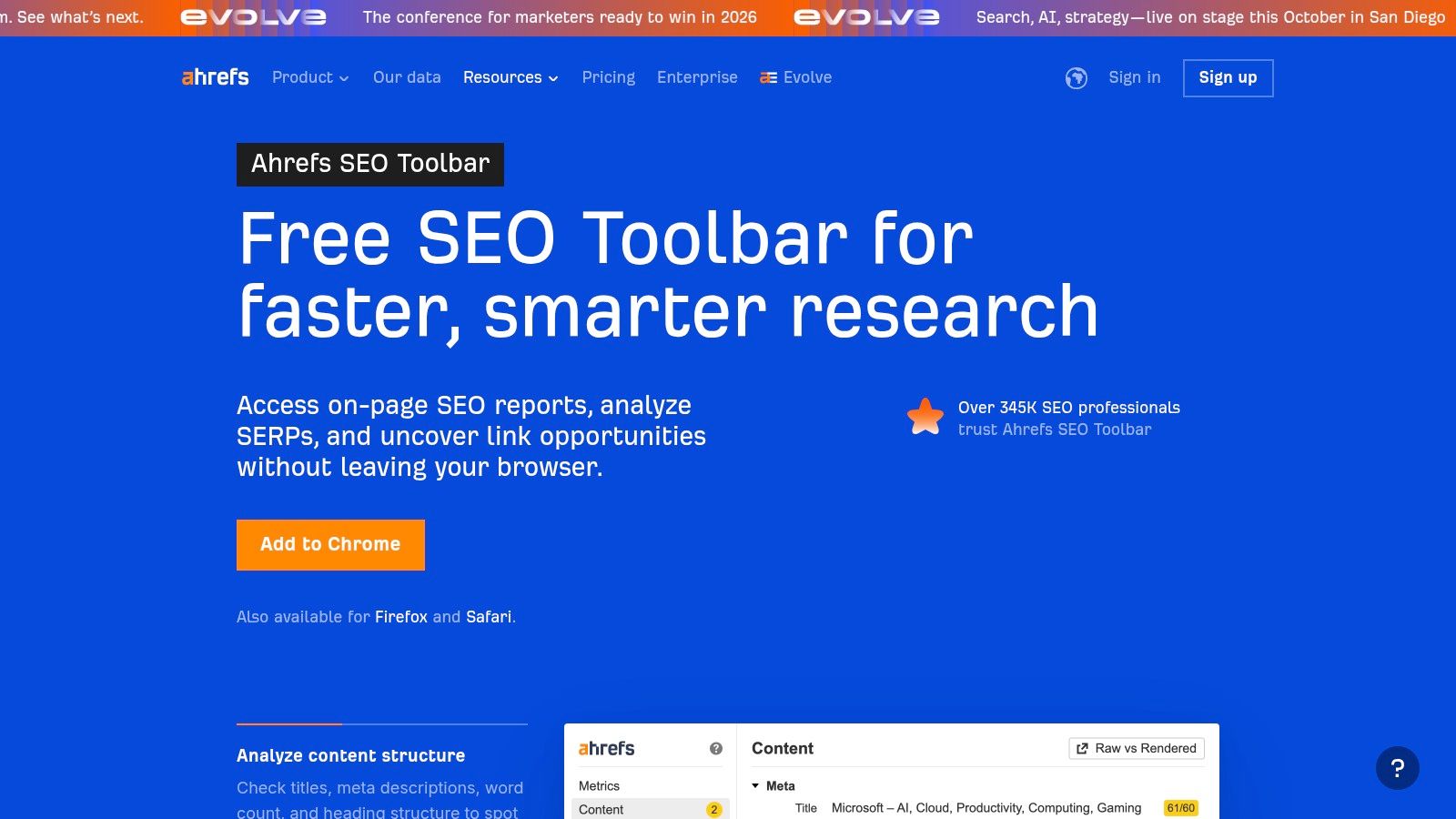
What I find most valuable is its ability to deliver a comprehensive on-page SEO report with a single click. This report instantly breaks down crucial elements like title tags, meta descriptions, headings, word count, canonicals, and hreflang tags, saving me significant time during content or technical audits. The SERP overlay, which shows Ahrefs metrics for each result, is also fantastic for competitor analysis.
Key Features & User Experience
The toolbar is intuitive and presents complex data in a very accessible format. The on-page report is organised into clear tabs (Content, HTML, Social, etc.), making it easy to navigate. A standout feature is the built-in redirect and HTTP header tracer, which is brilliant for diagnosing indexing issues or checking redirect chains. The broken link checker is another practical tool for quickly identifying and fixing 404 errors on a page.
While the core on-page features are free, metrics like Domain Rating (DR), URL Rating (UR), and backlink counts are only visible for Ahrefs subscribers. However, the free functionality is robust enough to stand on its own as a top-tier tool for on-page and technical SEO spot-checks. The interface is clean, non-intrusive, and highly responsive.
Practical Tip: Use the country switcher feature before performing a Google search to see how the SERPs look in different regions, like the UK or US. For a recent client targeting the Australian market, I used this to analyse the local SERP features and top competitors in Sydney, all from my desk in London, without needing a VPN.
Website: https://ahrefs.com/seo-toolbar
3. Moz — MozBar
For a quick, at-a-glance authority check on any website or search result, MozBar has long been a staple in my SEO toolkit. This is one of the original and most recognised SEO Chrome extensions, famous for bringing Moz’s proprietary metrics, Domain Authority (DA) and Page Authority (PA), directly into my browser and the SERPs. It provides a foundational layer of competitive insight that is incredibly useful for initial analysis.
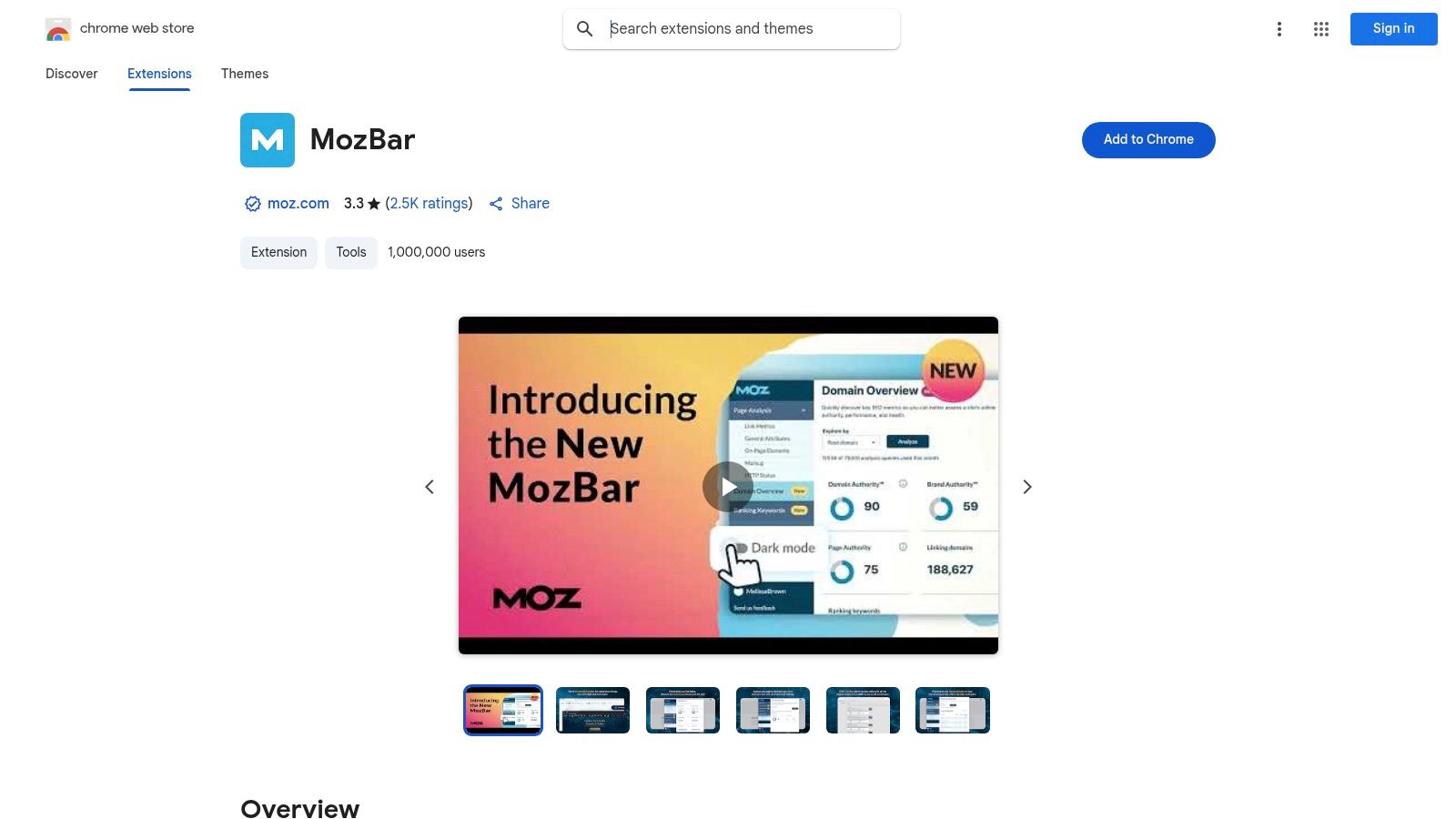
Its core value lies in the SERP overlay, which instantly shows me the DA and PA for every result, allowing for a rapid assessment of the competitive landscape for a given keyword. This visibility helps me gauge the difficulty of ranking without leaving Google. While the free version offers these core metrics, a Moz Pro subscription unlocks deeper link data and keyword difficulty insights.
Key Features & User Experience
The MozBar interface is a simple toolbar that sits at the top of your browser, activated with a single click. It allows me to highlight different link types on a page (followed, no-followed, internal, external), which is brilliant for a quick internal linking or backlink profile audit. On-page analysis features let me check elements like title tags, meta descriptions, and schema markup without digging into the source code.
The recent version 4 update brought a welcome refresh, including a dark mode and the ability to copy schema markup. However, the free plan is limited by a monthly API call quota, which power users may hit quickly. For full functionality, a paid Moz Pro subscription is required.
Practical Tip: Use the "Analyse Page" feature to quickly check a competitor's on-page elements. For instance, if I'm optimising an e-commerce product page, I’ll use it to see what schema (e.g., Product, Review) the top-ranking competitors are using. This is a fast way to identify opportunities to enhance your own rich snippets.
Website: https://chromewebstore.google.com/detail/mozbar/eakacpaijcpapndcfffdgphdiccmpknp
4. SEMrush — SEOquake
SEMrush's SEOquake is one of the classic SEO Chrome extensions that has been in my toolkit for years. It’s a powerful, free browser add-on that provides a wealth of on-page SEO data directly in your browser toolbar and overlays crucial metrics right onto the Search Engine Results Pages (SERPs). This makes it indispensable for quick competitor analysis without leaving Google.
Its standout feature is the SEObar, a customisable toolbar that sits at the top of your browser window. It displays key metrics like a page's Google Index count, Bing Index, SEMrush Rank, and backlinks information. I find this immediate access to top-level data incredibly efficient for getting a rapid snapshot of a page’s authority while browsing.
Key Features & User Experience
The SERP overlay is where SEOquake truly shines. It enriches each search result with detailed analytics, allowing for a quick comparison of the top-ranking pages. You can see domain authority, link metrics, and traffic estimates at a glance, and even export the entire SERP analysis as a CSV file for deeper investigation. The on-page SEO audit provides a fast checklist of potential issues, from missing meta tags to keyword density.
While the interface can feel a bit cluttered with all the data it presents, its customisability means you can turn off metrics you don't need. It’s a free tool, but its real power is unlocked when connected to a paid SEMrush account, which integrates more extensive backlink and keyword data directly into the extension.
Practical Tip: Use the "Keyword Density" report to quickly check if a competitor’s page is over-optimised for a specific term. Recently, I analysed a page that was struggling to rank and found its keyword density was over 5%, a clear sign of keyword stuffing. This tool gave me the data needed to recommend a more natural, user-focused content update.
Website: https://www.seoquake.com/
5. Keywords Everywhere
For instant keyword data directly within my search results, Keywords Everywhere is an indispensable part of my SEO toolkit. This extension brilliantly overlays crucial metrics like search volume, cost-per-click (CPC), and competition data onto Google, YouTube, Amazon, and other major platforms. This eliminates the need to constantly switch between my search window and a separate keyword research tool, streamlining my workflow significantly.

What makes Keywords Everywhere stand out is its pay-as-you-go credit system. Instead of committing to a monthly subscription, I purchase credits that are consumed as I search, which is perfect for freelancers or those with fluctuating research needs. This flexible pricing model provides access to powerful data without the hefty recurring fees of many other SEO tools.
Key Features & User Experience
The primary function is the seamless integration of keyword data into search engine results pages (SERPs). As I type a query, the extension automatically displays the metrics under the search bar and provides widgets for related keywords and "People also search for" suggestions. I find its bulk keyword analyser particularly useful for uploading a list of terms to get their metrics in one go, saving a huge amount of manual effort.
The user experience is incredibly intuitive, with the data appearing exactly where I need it. However, the credit system means I have to be mindful of my usage. For high-volume research days, costs can add up, so it requires a more deliberate approach compared to an unlimited subscription model.
Practical Tip: To conserve credits, I temporarily disable the extension via the browser toolbar when I'm not actively doing keyword research. You can also go into the settings and disable it on specific websites (like YouTube or Amazon) if you only need the data for Google searches. This simple step helps my credit packs last much longer.
Website: https://keywordseverywhere.com/
6. Surfer — Keyword Surfer
For quick, on-the-fly keyword research directly within the SERPs, Keyword Surfer is an indispensable and completely free tool. It enriches your Google search results by overlaying estimated monthly search volumes, cost-per-click data, and related keyword ideas right beside your search query. This immediate feedback loop is fantastic for initial brainstorming and assessing keyword viability without ever leaving the search page.
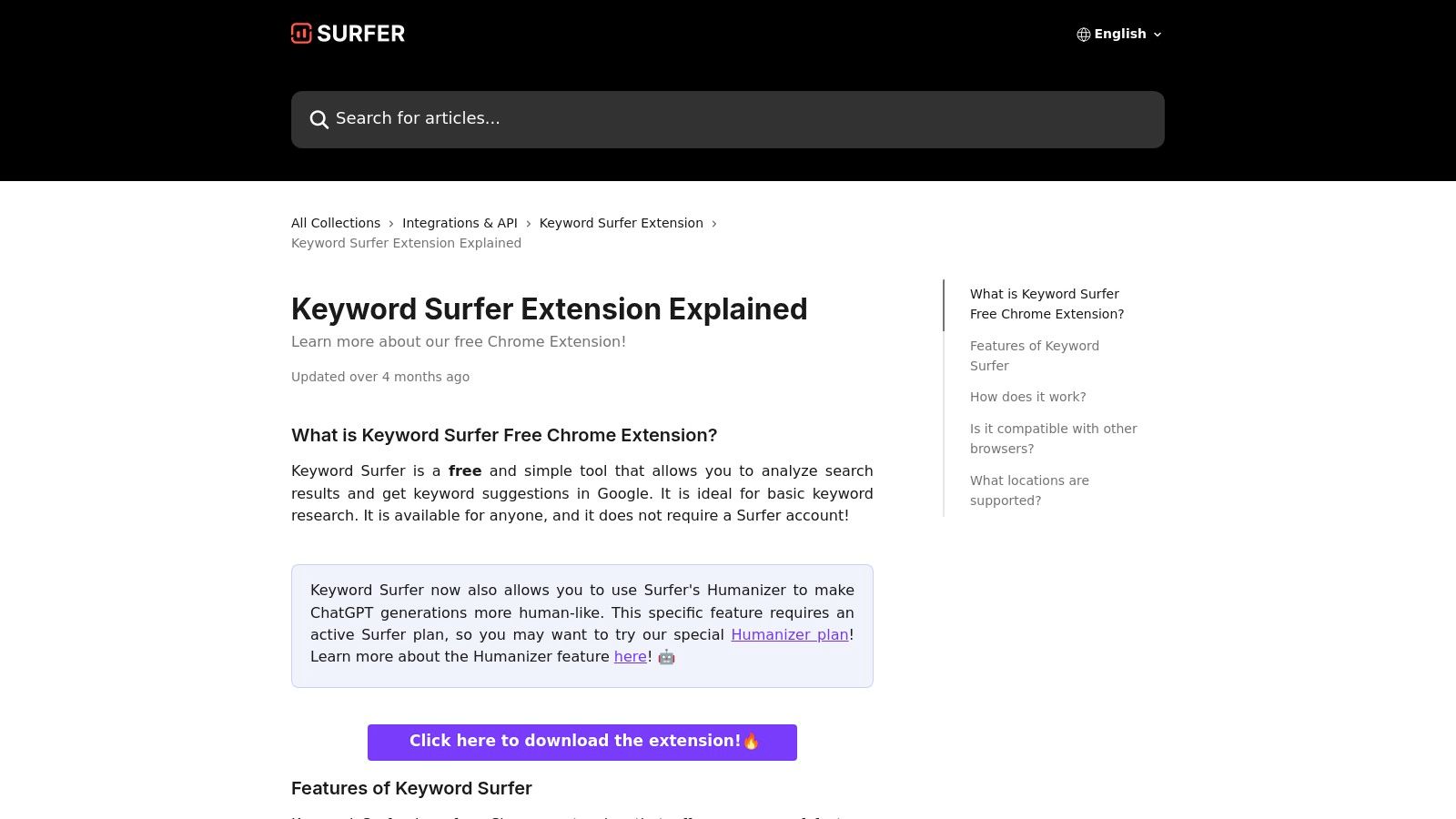
What makes Keyword Surfer so useful is its simplicity and lack of a paywall. While many SEO Chrome extensions gate their data, Surfer provides instant access for over 70 countries, including the UK. This localisation is crucial for my work, ensuring the data I see is relevant to my target audience. Its integration with Surfer's broader suite, known for its AI-driven content optimisation, adds another layer of value for users invested in that ecosystem.
Key Features & User Experience
The user experience is seamless; once installed, the data appears automatically within the Google search interface. You can easily view search volumes, find similar keywords, and see visibility metrics for top-ranking pages. The ability to create and export keyword collections directly from the SERP is a significant time-saver for organising research.
However, as a free tool, its data accuracy might not match premium suites like Ahrefs or Semrush. It’s best used for directional insights and preliminary research rather than as the sole source of truth for a major campaign. Some features have also been streamlined over time, focusing the tool on its core keyword research function.
Practical Tip: Use the country selector to switch to your target market (e.g., United Kingdom) before starting your research. Create a "Keyword Collection" for each project to quickly gather and save relevant terms, then export the entire list as a CSV file for further analysis in Google Sheets or Excel.
Website: https://docs.surferseo.com/en/articles/6679368-keyword-surfer-extension-explained
7. Mangools — SEO Extension
For those already invested in the Mangools ecosystem, their SEO Chrome extension is an essential companion. It elegantly integrates the power of their suite directly into your browser, offering a quick-glance dashboard of critical SEO metrics for any page you visit. It pulls in domain authority data from both Moz (DA/PA) and Majestic (CF/TF), providing a well-rounded view of a site’s authority.
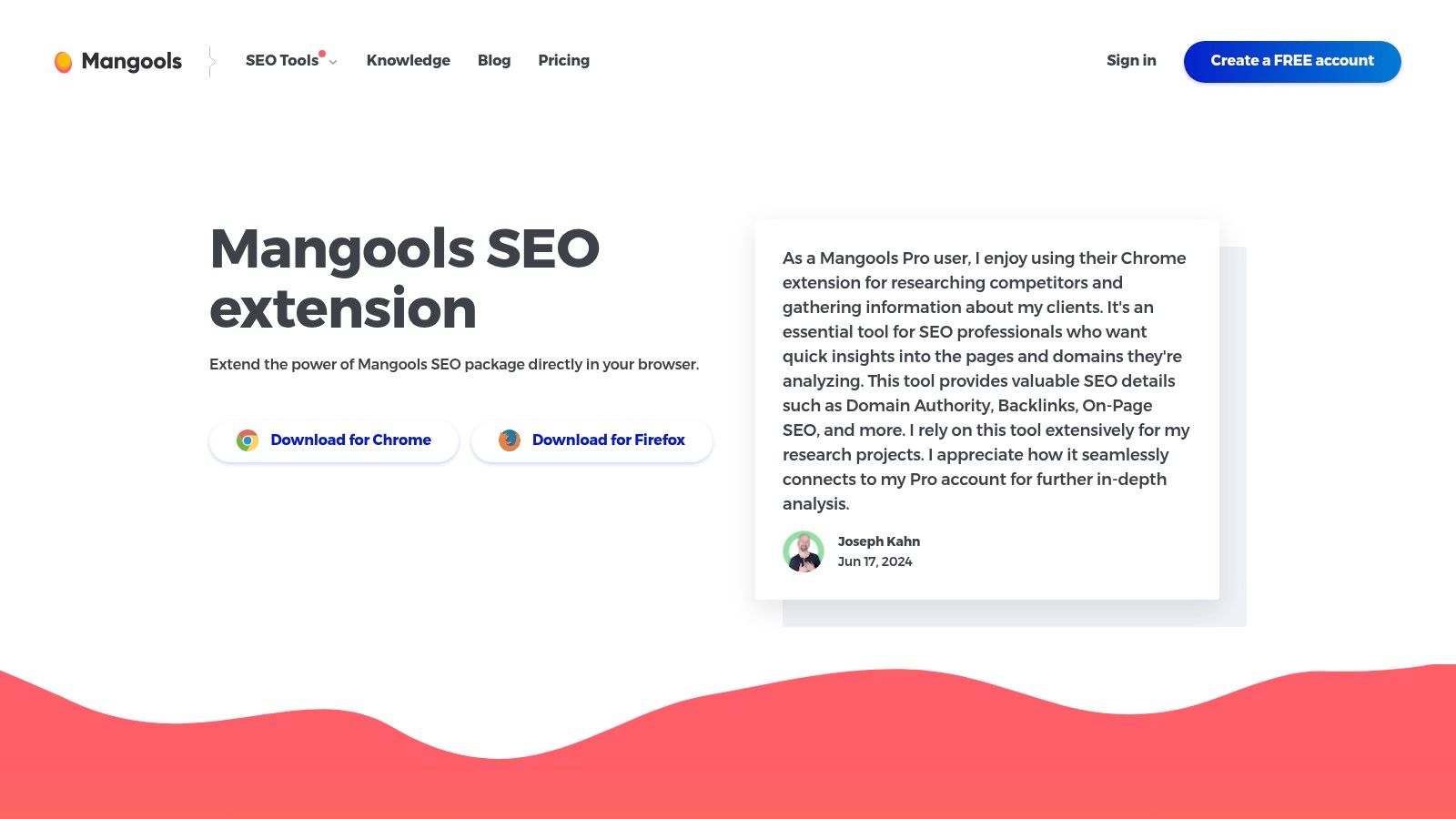
This extension truly shines when you have a Mangools subscription, as it serves as a direct gateway to deeper analysis in tools like KWFinder and SiteProfiler. Many advanced insights, including detailed backlink and keyword data, require a paid account, but the free version still offers valuable top-level information. Its seamless integration makes it a core part of many SEO automation software workflows.
Key Features & User Experience
The standout feature for me is the SERP simulator. It allows you to check search engine results for any location, including specific UK cities, which is invaluable for local SEO audits. The on-page SEO checker is also remarkably clean, giving a quick overview of headings, meta tags, and keyword density without overwhelming you with data.
While it isn’t as comprehensive as standalone enterprise tools, it isn’t trying to be. It's designed for efficiency, giving you the key data points you need to make quick decisions. The interface is clean and user-friendly, consistent with the rest of the Mangools product line-up.
Practical Tip: Use the SERP location simulator to check how your client’s website ranks in their target city versus your own location. This is a brilliant way to spot discrepancies in local search performance and identify opportunities for geo-targeted optimisation. For example, I used this to show a Manchester-based plumber that while they ranked well locally, they were invisible in nearby Bolton, highlighting a clear area for expansion.
Website: https://mangools.com/seo-extension/
8. Similarweb — Traffic & Engagement Insights Extension
When my competitive analysis needs to go beyond on-page elements and dive into traffic estimates, the Similarweb extension is my go-to tool. It provides a powerful, high-level snapshot of any website's performance directly in my browser, which is brilliant for quickly gauging a competitor's digital footprint. While not a traditional on-page SEO tool, understanding a rival's traffic sources and audience geography is a crucial part of building a comprehensive SEO strategy.
This extension excels at providing context. For instance, if I’m analysing a UK-based competitor, I can instantly see their estimated monthly visits, traffic sources (search, social, direct), and top-referring sites. This helps me prioritise my efforts; if a competitor gets significant traffic from a particular forum I've overlooked, I can investigate it as a potential link-building or content marketing opportunity.
Key Features & User Experience
The Similarweb extension integrates smoothly into Chrome, displaying a site's global, country, and category rank with a single click. The user interface is clean, presenting data through simple charts that visualise traffic trends and channel distribution over time. This makes it easy to spot seasonal patterns or the impact of a recent marketing campaign.
However, its convenience comes with a trade-off. To use the extension, you must consent to sharing anonymised browsing data, which may be a privacy concern for some users. Furthermore, the free version provides estimated data; the granular, more accurate insights are reserved for their paid platform. It's best used for directional analysis rather than exact figures.
Practical Tip: Use the "Geography" feature to validate your international SEO efforts. If you're targeting the UK market but see most of a competitor's traffic is from the US, it could indicate a gap you can exploit with more localised, UK-specific content and keywords.
Website: https://www.similarweb.com/corp/extension/
9. Serpstat — Website SEO Checker
Serpstat's SEO Chrome extension acts as a powerful on-page SEO auditor directly within your browser. While it integrates deeply with its parent platform, the extension itself provides immediate, actionable insights into a page's technical structure without needing to open a new tab. I often use it for quick spot-checks on competitor pages or for a first-pass audit of a new client's website.
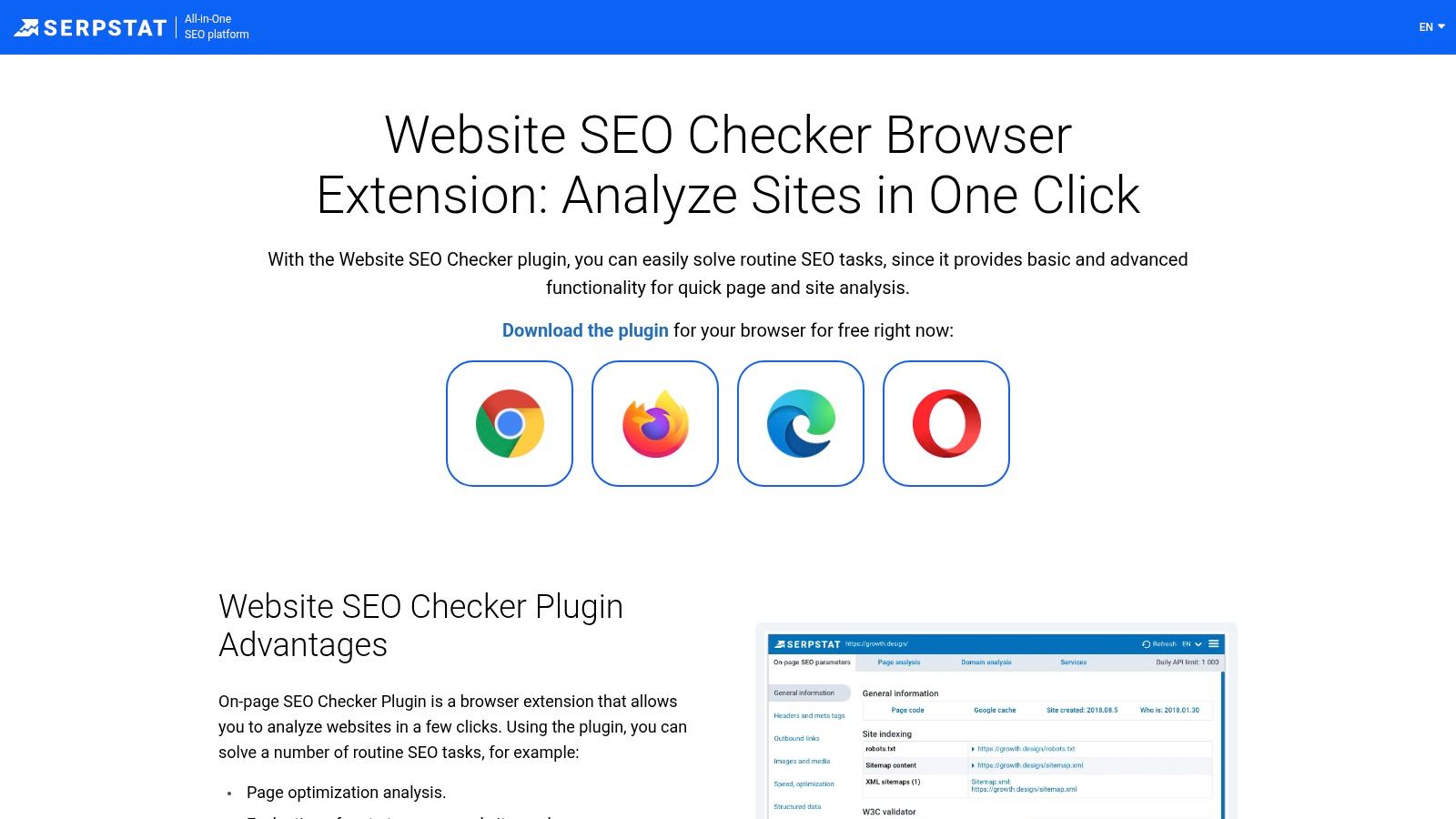
What makes it particularly useful for UK-focused campaigns is its built-in region and language selection. This allows me to analyse a page as if I were a search engine bot crawling from the UK, ensuring the data I see is relevant to my target market. This is a critical feature that many other on-page analysers overlook.
Key Features & User Experience
The extension provides a clean, data-rich overlay that breaks down key on-page elements. With a single click, I can highlight all H1-H6 headings, identify images missing ALT text, or see which links are tagged as 'nofollow'. This visual highlighting saves a significant amount of time compared to manually inspecting the page source code.
While the interface is more technical than some alternatives, its directness is a strength for experienced SEOs. The free plan operates on a daily request limit tied to your API token, which is generous enough for casual use. However, for intensive research, you’ll quickly find the need to upgrade to a paid Serpstat plan for a higher allowance. The full platform integration is where the tool truly shines, turning this simple checker into a gateway for comprehensive domain and keyword analysis.
Practical Tip: Use the 'nofollow' link highlighter when analysing a competitor’s backlink strategy. It can help you quickly identify potential guest post opportunities versus paid or user-generated links that may not pass SEO value, giving you a clearer picture of their link-building efforts.
Website: https://serpstat.com/page/extension-en/
10. Majestic – Backlink Analyzer
For deep-dive backlink analysis directly within my browser, I rely on the Majestic Backlink Analyzer. As one of the original pioneers in link intelligence, Majestic provides its own proprietary and extensive link index, offering a trusted alternative to other major SEO platforms. This extension brings their core metrics, Trust Flow (TF) and Citation Flow (CF), right to your toolbar, giving an instant read on a page's authority and link quality.
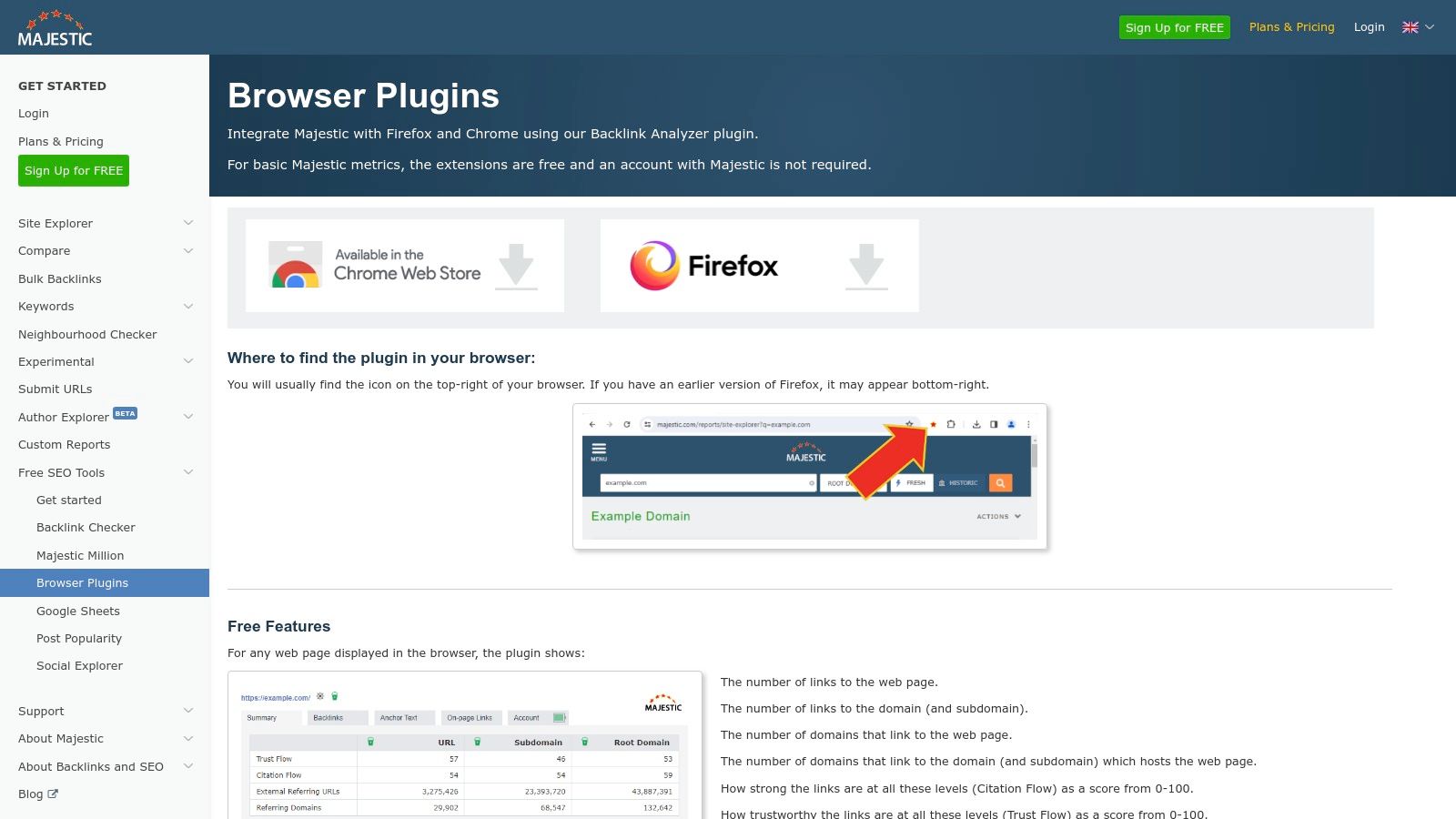
What I appreciate most is Majestic's fresh index, which is regularly updated, providing timely data that is crucial for competitor analysis or link prospecting. This focus on link data quality makes it a specialist tool, rather than a jack-of-all-trades, which is why it has earned its place in my SEO toolkit for years.
Key Features & User Experience
The Majestic extension provides a clean, data-rich overlay. At a glance, I can see the TF and CF scores for the exact URL and the root domain, along with the total number of external backlinks and referring domains. The summary tab also includes useful link profile charts that visualise the balance between trust and citation, which is excellent for a quick health check.
While the free version offers these top-level metrics (sometimes requiring a captcha), a paid subscription is necessary to unlock the granular backlink data. Heavy users might find the free authentication sessions expire quickly, prompting a login. However, for quick, authoritative checks on a site's link profile, it remains one of the best SEO Chrome extensions available.
Practical Tip: Use the TF/CF ratio as a quick quality filter when evaluating potential link-building targets. A site with a high Citation Flow but a very low Trust Flow (e.g., CF 40, TF 5) may have a large quantity of low-quality links, making it a less desirable prospect for outreach. I aim for a ratio closer to 1:1.
Website: https://majestic.com/majestic-widgets/plugins
11. GrowthBar — Chrome Extension + AI SEO Suite
GrowthBar positions itself differently from many other SEO Chrome extensions by tightly integrating SERP analysis with AI-powered content creation. It’s designed for SEOs and content marketers who want to move from research to writing within a single, unified workflow. Its primary function is to overlay valuable SEO metrics directly onto Google's search results pages, providing immediate insights into keyword difficulty, domain authority, and traffic estimates for any ranking page.
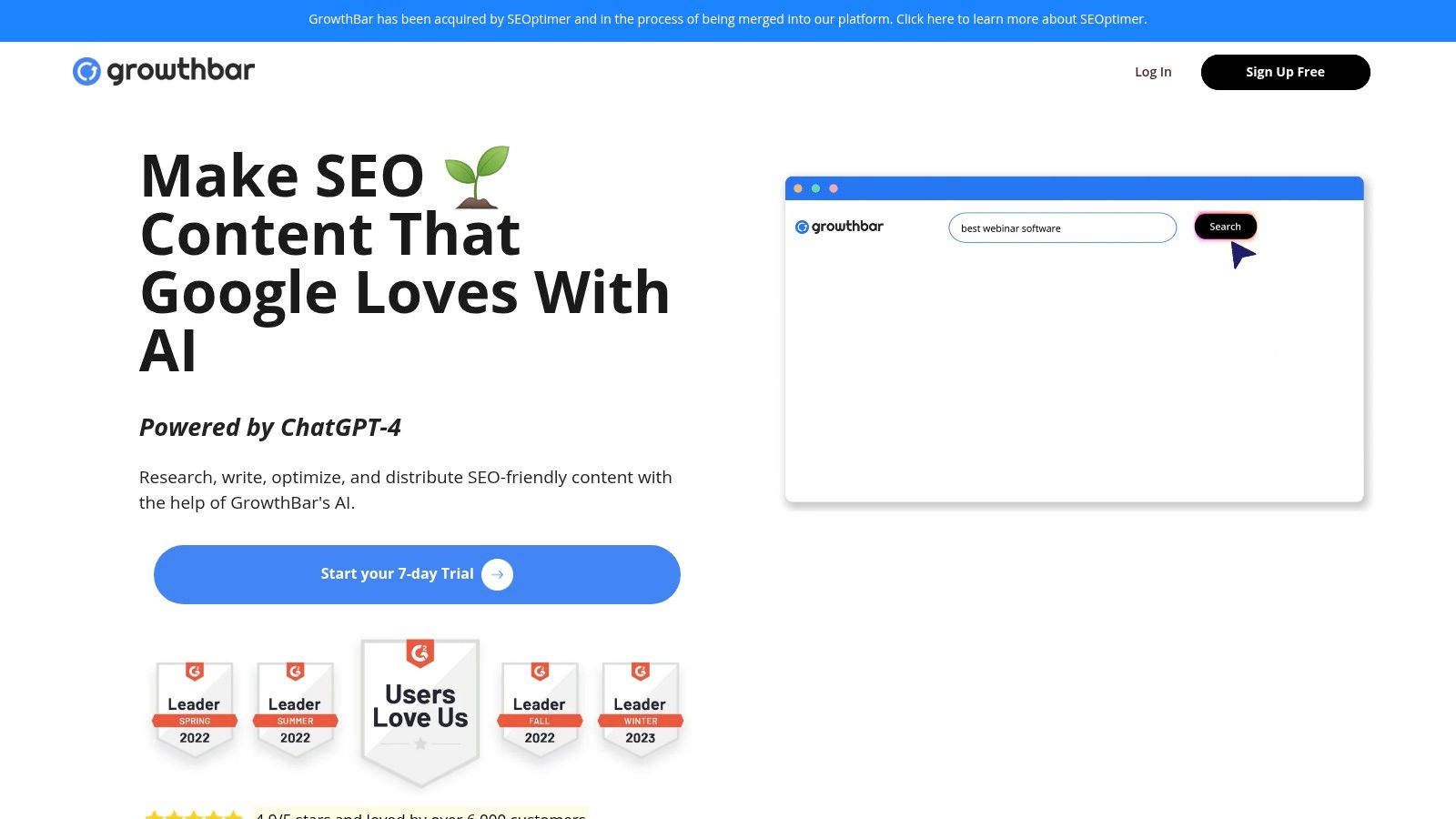
What makes GrowthBar stand out is its direct link to an AI writing assistant. From the SERP, I can generate a content outline based on the top-ranking results, complete with keyword suggestions, word count targets, and headline ideas. This seamless transition from analysis to creation is a significant time-saver, particularly for content-heavy projects. The extension is part of a paid subscription to the GrowthBar platform, which starts at around $48 per month, so it’s geared towards professionals rather than casual users.
Key Features & User Experience
The GrowthBar extension is intuitive, presenting its data in a clean, non-intrusive panel alongside your search results. Key metrics like keyword suggestions, CPC data, and competitor backlinks are available with a single click. The real power, however, lies in its connection to the main application. You can send insights directly to the AI content editor, which helps create SEO-optimised drafts quickly.
While it excels at combining SERP data with content generation, it lacks the deep technical SEO and backlink analysis capabilities of dedicated tools like Ahrefs or Moz. It's best viewed as a content-first SEO tool. The integration with WordPress is another practical advantage, allowing users to write and optimise directly within their CMS.
Practical Tip: Use the "Content Outline" feature directly from the SERP view to generate a structured brief for your next blog post. I then customise this outline with my unique insights and client-specific examples before feeding it into the AI writer. This ensures the final content is both original and SEO-optimised, not just a generic summary of existing articles.
Website: https://www.growthbarseo.com/
12. Detailed — Detailed SEO Extension
Developed by SEO veteran Glen Allsopp, the Detailed extension is a masterclass in efficiency and privacy. It was built to streamline the daily on-page SEO audit process without the bloat, subscriptions, or data tracking common in other tools. Its primary strength lies in providing a clean, one-click overview of the most critical on-page elements.
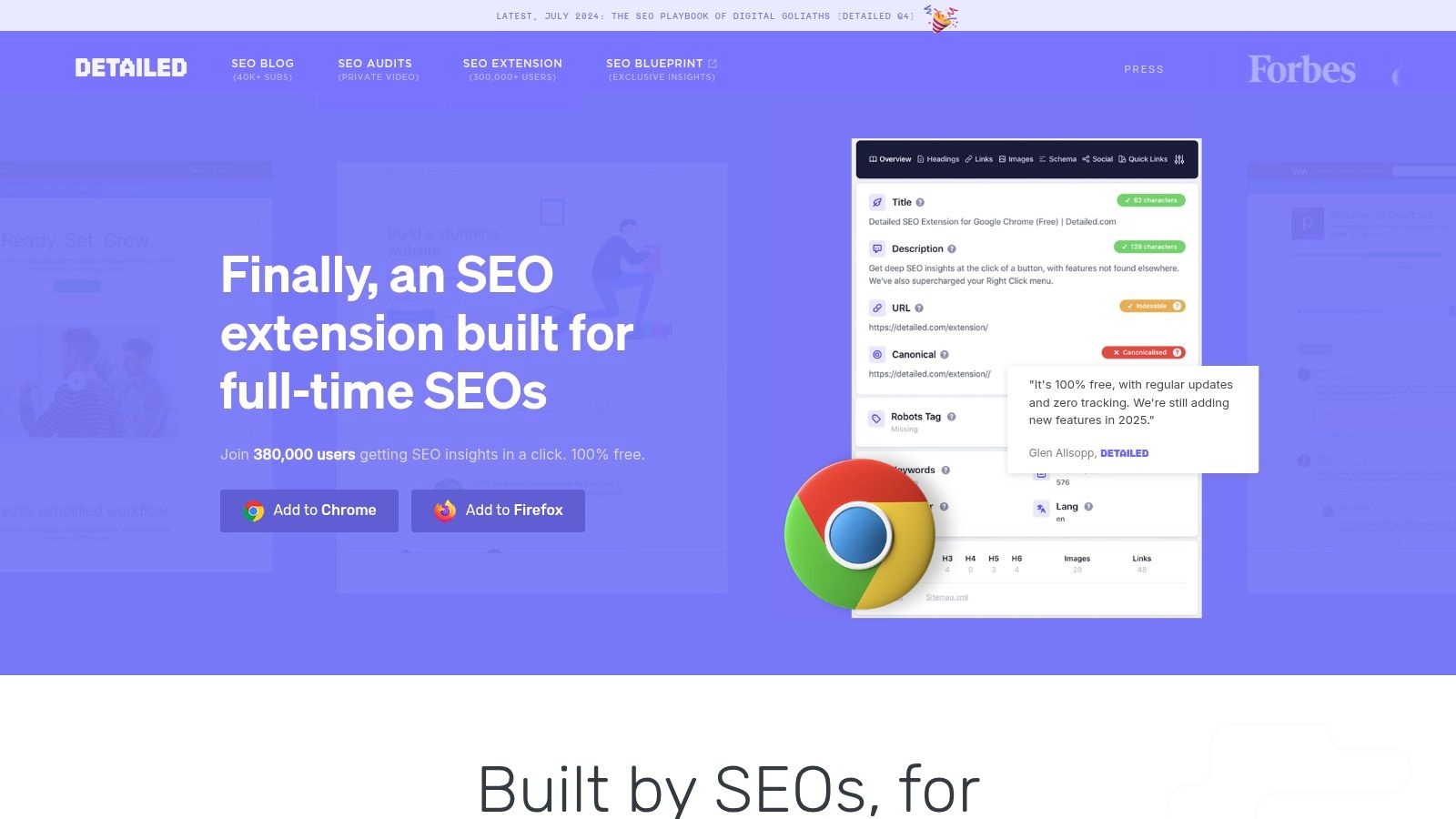
What makes this one of my favourite SEO Chrome extensions is its respect for my privacy; it's completely free and doesn't track any user activity. This focus on core, practical features makes it an indispensable part of my initial technical SEO checks on any given webpage.
Key Features & User Experience
The Detailed extension presents on-page data in a beautifully organised tabbed interface, covering everything from title tags and meta descriptions to a full breakdown of heading structures (H1-H6). It also provides a comprehensive view of links, images with and without alt text, and any schema markup present on the page.
Its standout feature for me is the right-click context menu. I can highlight any text on a page, right-click, and instantly search for it as a keyword in Ahrefs or check Google’s cache. This seamless integration with other major SEO platforms saves a remarkable amount of time during competitor research or content analysis.
Practical Tip: Use the "Export Links" or "Export Images" feature to quickly generate a CSV file of all URLs or image assets on a page. This is incredibly useful for conducting a swift content audit or identifying images missing alt text without needing to crawl the site. For example, during a site migration check, this helps me quickly verify internal linking structures on key pages.
Website: https://detailed.com/extension/
Top 12 SEO Chrome Extensions Feature Comparison
| Extension | Core Features | User Experience / Quality | Value Proposition | Target Audience | Price Point |
|---|---|---|---|---|---|
| Chrome Web Store | Central hub, developer verification, reviews | Secure, easy install & updates | Safe, direct source for SEO extensions | All SEO tool users | Free |
| Ahrefs — SEO Toolbar | On-page audits, SERP metrics, redirect tracer | Robust free tools, subscriber integration | Deep technical SEO data with paid plans | SEO professionals & agencies | Free + Paid subscription |
| Moz — MozBar | DA/PA metrics, link & on-page audits, SERP overlay | Fast, popular, recently updated | Quick authority checks, Moz Pro enhancements | SEO analysts & marketers | Free + Moz Pro subscription |
| SEMrush — SEOquake | Page/SERP audits, keyword density, link analysis | Feature-rich, quick competitive insights | Free rapid SEO audits, SEMrush integration | SEO specialists & competitors | Free + SEMrush paid plans |
| Keywords Everywhere | Keyword volume, CPC, bulk lookup, domain insights | Flexible credit-based pricing | Time-saving overlays, pay-as-you-go credits | Keyword researchers & marketers | Pay-as-you-go credits |
| Surfer — Keyword Surfer | Real-time keyword volumes, CSV export, country selector | Completely free, user-friendly | No cost lightweight keyword research | Beginners & budget-conscious users | Free |
| Mangools — SEO Extension | Domain metrics, backlinks, SERP simulator | All-in-one, geo-based local SEO | Best with Mangools suite, local SERP testing | Users of Mangools suite | Paid subscription needed |
| Similarweb Extension | Traffic, engagement, rankings, traffic source mix | Fast competitive insights | High-level market & competitor prioritization | Market analysts, strategists | Free + enterprise options |
| Serpstat — Website SEO Checker | On-page element checks, region targeting | Technical, region-specific insights | Solid technical SEO with UK targeting | Technical SEOs & UK market | Free + paid plans |
| Majestic — Backlink Analyzer | Backlink counts, CF/TF scores, link profile charts | Strong backlink analysis, fresh data | UK-based, updated backlink insights | Link analysts & backlink specialists | Free limited + subscription |
| GrowthBar — AI SEO Suite | Keyword ideas, AI content tools, WordPress integration | AI-powered SEO + content creation | Combines SEO data with writing workflows | Content teams & marketers | Paid subscription only |
| Detailed — SEO Extension | On-page insights, schema, PAA extraction, privacy-focused | Free, privacy-friendly, fast workflow | No tracking, time-saving practical SEO | Privacy-conscious SEO practitioners | Free |
Integrating These Extensions Into Your Daily SEO Practice
I have explored a powerful arsenal of the best SEO Chrome extensions available, moving from all-in-one toolbars like Ahrefs and MozBar to highly specialised tools such as the Majestic Backlink Analyzer and the instant-insight Detailed SEO Extension. Each tool offers a unique lens through which to view a webpage, providing critical data directly within your browser and eliminating the need to constantly switch between different platforms. The journey from on-page analysis and keyword research to technical SEO audits and competitor analysis can be streamlined dramatically with the right add-ons.
However, the real power isn’t in simply installing all twelve of these extensions. Having the right tools is only half the battle; knowing how to integrate them into a cohesive workflow is what truly drives results. I don't use all of these extensions every single day. Instead, I have a core set for daily checks and specific tools I deploy for particular tasks. The goal isn't to collect extensions, but to build a system that delivers consistent, data-driven outcomes.
Building Your Personalised SEO Toolkit
To avoid tool overload and make these extensions work for you, I recommend a phased approach. Start by identifying your most common and time-consuming SEO tasks.
- For On-Page & Technical Audits: If your daily work involves quick on-page checks, start with Detailed SEO Extension and MozBar. Detailed gives you a lightning-fast overview of meta tags, headers, and schema, while MozBar provides immediate Domain Authority and Page Authority metrics. This combination covers 80% of routine on-page spot-checks.
- For Keyword Research & Content Ideation: If you are a content creator, your initial toolkit should be Keywords Everywhere and Keyword Surfer. These two work brilliantly together. Keywords Everywhere will inject search volume, CPC, and related keyword data into your Google search results, while Keyword Surfer provides valuable SERP analysis and content guidelines without you ever leaving the results page.
- For Competitor & Backlink Analysis: For those focused on off-page SEO and competitive intelligence, the Ahrefs SEO Toolbar and Majestic Backlink Analyzer are indispensable. Use the Ahrefs toolbar for a deep dive into a competitor’s on-page structure and internal linking, then switch to Majestic to quickly assess the quality and volume of their backlink profile.
I advise you to start by installing just two or three extensions that align with your most frequent tasks. Get comfortable with them, understand their limitations, and observe how they speed up your process. For instance, realise that while SEOquake is incredibly data-rich, it can sometimes slow down your browser. Acknowledging this allows you to enable it only when you need its specific diagnostic reports. As you build confidence, you can create a personalised toolkit that makes you a more efficient and effective SEO professional.
Final Considerations for Implementation
Before you go on an installation spree, remember a few key points. Firstly, more extensions can lead to a slower browser experience. Be selective and disable the ones you aren't actively using. Secondly, while many of these tools offer fantastic free versions, their true power is often unlocked with a paid subscription. Factor this into your budget and choose the tools that provide the highest return on investment for your specific business needs.
Ultimately, the best suite of SEO Chrome extensions is the one that you use consistently. These tools are designed to augment your expertise, not replace it. They provide the data, but it is your strategic interpretation and implementation that will improve your website's visibility, drive organic traffic, and achieve your business goals. Use them to build faster, more informed processes and turn raw data into a decisive competitive advantage.
Feeling overwhelmed with data and need a strategic partner to turn these insights into tangible growth? At Mersudin Forbes Digital, I specialise in building comprehensive SEO strategies that go beyond tools, focusing on sustainable results for your business. Visit Mersudin Forbes Digital to see how I can help you translate analytics into revenue.


